英语翻译省略法
- 格式:ppt
- 大小:54.00 KB
- 文档页数:13
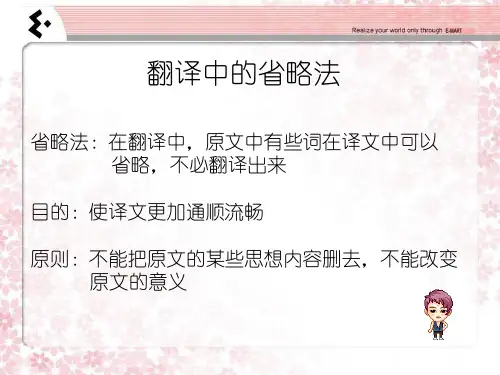
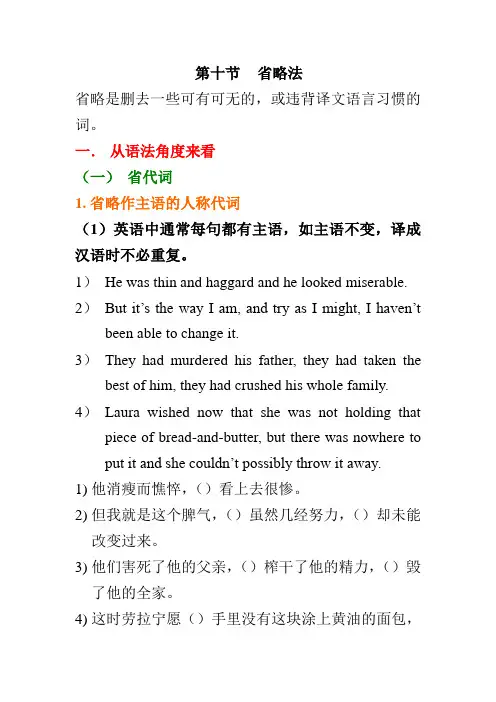
第十节省略法省略是删去一些可有可无的,或违背译文语言习惯的词。
一.从语法角度来看(一)省代词1.省略作主语的人称代词(1)英语中通常每句都有主语,如主语不变,译成汉语时不必重复。
1)He was thin and haggard and he looked miserable. 2)But it’s the way I am, and try as I might, I haven’t been able to change it.3)They had murdered his father, they had taken the best of him, they had crushed his whole family.4)Laura wished now that she was not holding that piece of bread-and-butter, but there was nowhere to put it and she couldn’t possibly throw it away.1)他消瘦而憔悴,()看上去很惨。
2)但我就是这个脾气,()虽然几经努力,()却未能改变过来。
3)他们害死了他的父亲,()榨干了他的精力,()毁了他的全家。
4)这时劳拉宁愿()手里没有这块涂上黄油的面包,拿着又没有地方放,()又不可能扔掉。
作业:1.I am 78 years old; I have been confined to my room with a paralytic stroke for the past 14 months.2. Like his friend he had many wonderful ideas, but he only put a few into practice.3. We can measure the amount of water in a pot, but we can’t measure its heat. We haven’t an instrument for that.4. The Grand Dukes always liked new ideas, and later they were good friends of Galileo.(2)泛指的英语人称代词作主语时,即使是第一个主语,汉译时也可省略。
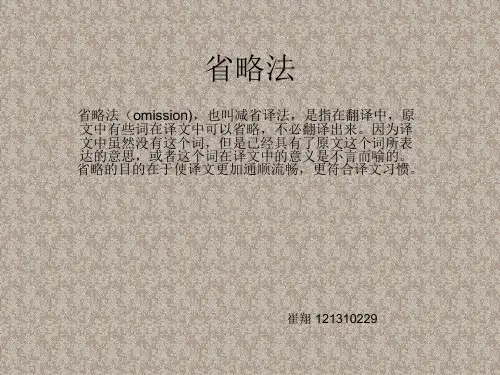
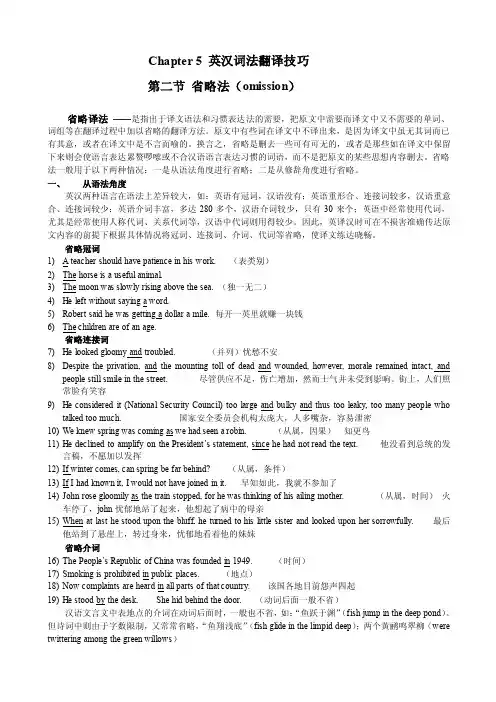
Chapter 5 英汉词法翻译技巧第二节省略法(omission)省略译法——是指出于译文语法和习惯表达法的需要,把原文中需要而译文中又不需要的单词、词组等在翻译过程中加以省略的翻译方法。
原文中有些词在译文中不译出来,是因为译文中虽无其词而已有其意,或者在译文中是不言而喻的。
换言之,省略是删去一些可有可无的,或者是那些如在译文中保留下来则会使语言表达累赘啰嗦或不合汉语语言表达习惯的词语,而不是把原文的某些思想内容删去。
省略法一般用于以下两种情况:一是从语法角度进行省略;二是从修辞角度进行省略。
一、从语法角度英汉两种语言在语法上差异较大,如:英语有冠词,汉语没有;英语重形合、连接词较多,汉语重意合、连接词较少;英语介词丰富,多达280多个,汉语介词较少,只有30来个;英语中经常使用代词,尤其是经常使用人称代词、关系代词等,汉语中代词则用得较少。
因此,英译汉时可在不损害准确传达原文内容的前提下根据具体情况将冠词、连接词、介词、代词等省略,使译文练达晓畅。
省略冠词1) A teacher should have patience in his work. (表类别)2)The horse is a useful animal.3)The moon was slowly rising above the sea. (独一无二)4)He left without saying a word.5)Robert said he was getting a dollar a mile. 每开一英里就赚一块钱6)The children are of an age.省略连接词7)He looked gloomy and troubled. (并列)忧愁不安8)Despite the privation, and the mounting toll of dead and wounded, however, morale remained intact, andpeople still smile in the street. 尽管供应不足,伤亡增加,然而士气并未受到影响。
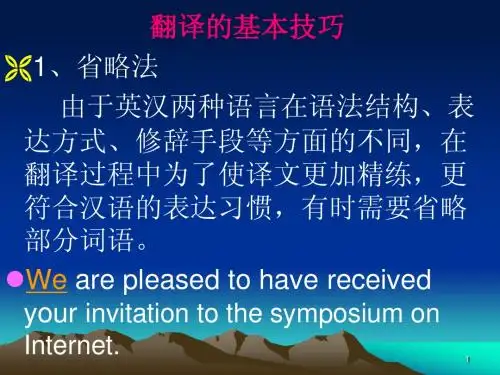


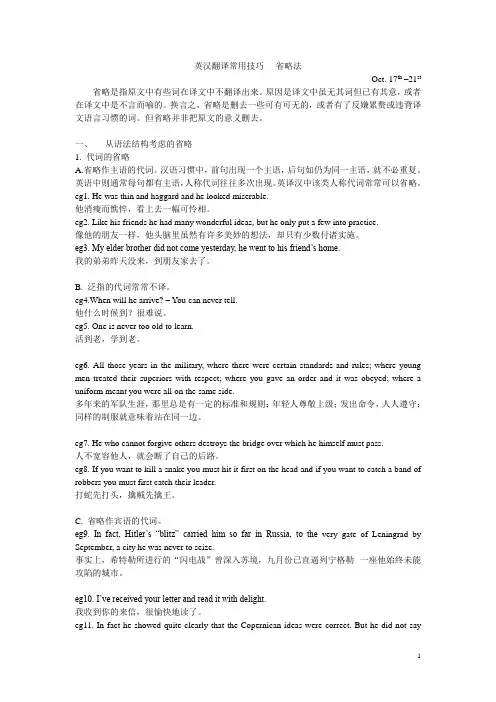
英汉翻译常用技巧----省略法Oct. 17th–21st 省略是指原文中有些词在译文中不翻译出来。
原因是译文中虽无其词但已有其意,或者在译文中是不言而喻的。
换言之,省略是删去一些可有可无的,或者有了反嫌累赘或违背译文语言习惯的词。
但省略并非把原文的意义删去。
一、从语法结构考虑的省略1. 代词的省略A.省略作主语的代词。
汉语习惯中,前句出现一个主语,后句如仍为同一主语,就不必重复。
英语中则通常每句都有主语,人称代词往往多次出现。
英译汉中该类人称代词常常可以省略。
eg1. He was thin and haggard and he looked miserable.他消瘦而憔悴,看上去一幅可怜相。
eg2. Like his friends he had many wonderful ideas, but he only put a few into practice.像他的朋友一样,他头脑里虽然有许多美妙的想法,却只有少数付诸实施。
eg3. My elder brother did not come yesterday, he went to his friend’s home.我的弟弟昨天没来,到朋友家去了。
B. 泛指的代词常常不译。
eg4.When will he arrive? – You can never tell.他什么时候到?很难说。
eg5. One is never too old to learn.活到老,学到老。
eg6. All those years in the military, where there were certain standards and rules; where young men treated their superiors with respect; where you gave an order and it was obeyed; where a uniform meant you were all on the same side.多年来的军队生涯,那里总是有一定的标准和规则;年轻人尊敬上级;发出命令,人人遵守;同样的制服就意味着站在同一边。
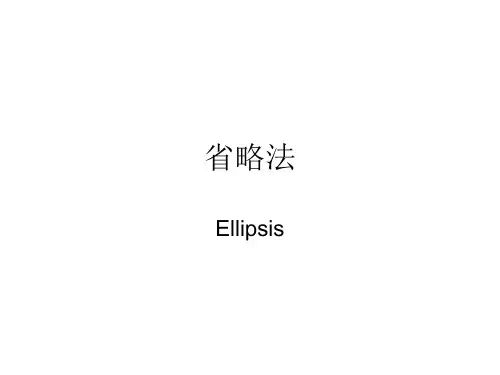
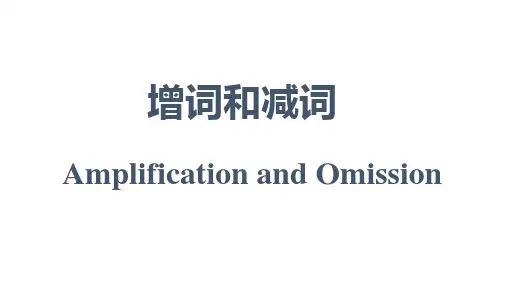
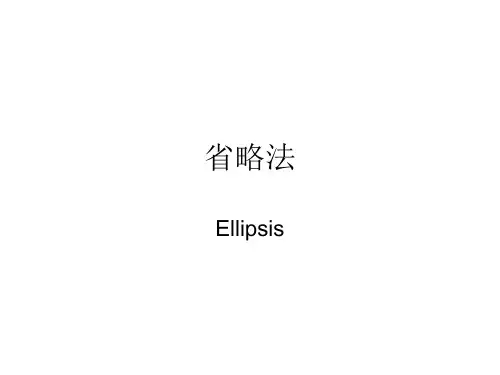
最全英语翻译方法大全(4)译文加上 to begin with (起初,开始时),使上下文逻辑连贯, 加上but when使英语文理通顺。
第三节省略法省略法(Omisssion),是指不译出原文中的某些词。
正如增词法不是随意增加原文的意思一样,省略法也不是要删去原文的意思,而是省去那些在译文中不言而喻的字词,或省去那些译出来反嫌累赘或不合汉语习惯的词语。
一般来说,省略有的是出于结构上的需要,有的是出于修辞上的需要。
现在分类举例说明。
一、英译汉时的结构性省略结构性省略,也称句法省略,主要是省略虚词,如代词,冠词,介词,连词等。
例如:•Follow the river and you will get to the sea.顺藤摸瓜。
(省略代词和冠词)•Let me tell you, time is a very precious gift of God; so precious that He only give it to us moment by moment. He would not have you waste it.让我来告诉你吧,时间是上帝赐予的极其珍贵的礼物。
惟其珍贵,他才一点一点地赐予。
他不愿让你白白浪费。
(省略代词,冠词和介词) •In my childhood, I experienced a great deal about poverty and suffering.童年时代我就体味了贫穷和苦难(省略介词和代词)•We live and learn.活到老,学到老(省略代词)•It is a good horse that never stumbles.好马也有失蹄时。
(或:智者千虑,必有一失)(省略代词)•If winter comes, can spring be far behind?冬天来了,春天还会远吗?(省略连词if)从以上例子可以看出,翻译时虚词的省略可使译文显得简洁,洗练,也符合汉语“形合”的特点。